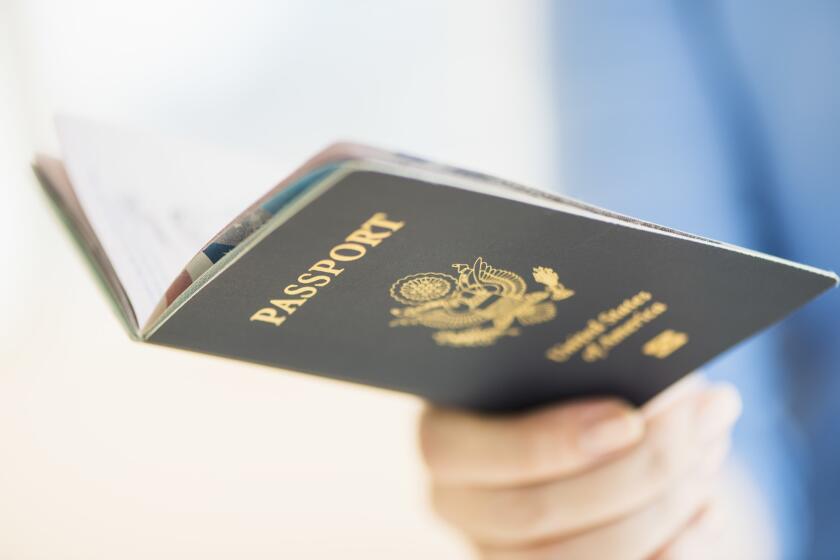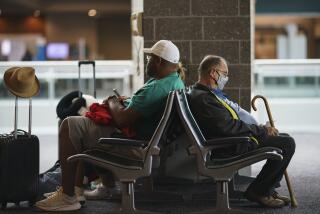Travel industry offers new safety procedures in bid to revive business
- Share via
Hoping to give Americans confidence to travel again, the nation’s biggest travel trade group has unveiled enhanced cleaning, social distancing and touchless payment procedures for hotels, airlines, airports, theme parks, restaurants and cruise lines.
The protocols by the U.S. Travel Assn. are an attempt by travel business leaders to help revive an industry that was setting profit and passenger total records only a few months ago but has been losing about $18 billion a week since the coronavirus began to spread in the U.S. in March.
The protocols for operating in a post-COVID-19 world don’t dictate when it’s safe to travel again but set basic standards that all travel and hospitality businesses must adhere to once government and medical experts lift stay-at-home orders and give a green light for leisure and business travel.
Travel businesses, such as airlines, hotels and cruise lines, will be encouraged to adopt specific protocols for their own industry. The American Hotel and Lodging Assn. released its protocols Monday, in cooperation with the U.S. Travel Assn.
“When officials give the clearance to travel, we want to give the public confidence that they can travel again,” Roger Dow, president of the U.S. Travel Assn., said in a conference call Monday.
Most of the steps called for by the U.S. Travel Assn. are among the practices promoted for weeks by the Centers for Disease Control and Prevention, including increased cleaning and hand washing, installation of physical barriers, use of masks and gloves and social distancing.
Dr. Michael D. Parkinson, past president of the American College of Preventive Medicine, said he worked on the travel industry protocols with the trade group to establish very broad and basic standards, noting that experts still have many unanswered questions about the virus.
“This is a work in progress,” he said. “I can tell you the science is changing and the numbers are changing.”
The hotel trade group’s protocols call on housekeepers to stay out of a guest room until after a guest checks out and requires that groups lounging around hotel pools be kept separate by at least six feet. In addition, the hotel protocols say that if a guest has tested positive for COVID-19, the room where that guest stayed “shall not be returned to service until undergoing an enhanced cleaning and disinfecting utilizing EPA approved products within CDC guidelines.”
Last week, Hilton Corp., one of the world’s largest hotel companies, announced a new cleanliness standard called CleanStay, in partnership with the manufacturer of Lysol cleaners. Choice Hotels on Monday announced a new cleaning protocol that includes using hospital-grade disinfectant at such high-use areas as the front desk, the pools and the gyms.
Kate Walsh, dean of Cornell University’s School of Hotel Administration, said the biggest challenge for the hospitality industry is to convey a welcoming atmosphere while hotel staff are practicing social distancing and staying clear of guests. At the same time, staff must be trained to be visible while continually sanitizing facilities, she said.
“The entire business model and value proposition will need to be reexamined,” Walsh said. “However, this is also an opportunity to rethink what service truly means in this new normal.”
Travel has changed since the global pandemic began its trip around the world. Here are things that can help you navigate these difficult times and plan for the future.
In a sign that some travel companies are ready to relaunch service, Carnival Corp., the world’s largest cruise company, said Monday that trips will resume Aug. 1 from Miami, Galveston, Texas, and Port Canaveral, Fla. All other cruises in North American and Australian markets will be canceled through Aug. 31.
Carnival is calling the launch of the first cruises part of its “plan to phase in service.”
“We will use this additional time to continue to engage experts, government officials and stakeholders on additional protocols and procedures to protect the health and safety of our guests, crew and the communities we serve,” Carnival Corp. said in a statement.
Although the country’s airlines haven’t adopted uniform protocols for air travel, the nation’s largest airlines announced last week that passengers will be required to wear masks or other face coverings during flights. Some of the largest carriers are also requiring masks and face covers for flight attendants and other employees.
United, Delta and JetBlue implemented the requirement starting Monday; American, Southwest and Alaska Airlines will implement the mask requirement starting May 11.
In announcing the protocols, Dow noted that the travel industry has been particularly hard hit by the coronavirus outbreak, with the loss of 8 million jobs in the industry in the last few months.
Asked how travel businesses can afford to adopt the new protocols, Dow said the industry has no choice but to spend the money to regain the trust of the public to travel again.
“The cost is one they will bear because the cost of not doing it is worse,” he said.
Disneyland, Magic Mountain, Universal Studios, Knotts Berry Farm and Sea World closed due to coronavirus . These aerial photos show the deserted scene.
California is projected to lose $72.1 billion in visitor spending this year, nearly half of what was generated in 2019, according to a study released Monday by Visit California, the state’s nonprofit tourism agency.
The study also said the pandemic will eliminate 613,000 California jobs in May, more than half the workforce that had grown an average of 3.2% annually for the last decade.
Dow said his trade group has been talking with dozens of leaders in the travel business, including Walt Disney Co., which he said is also working on protocols for reopening theme parks.
“We will see Disney evolve in a very positive way,” Dow said.
Conventions and trade shows will probably be the last segment of the travel industry to open, he said, adding that convention managers are also working to come up with procedures for having large gatherings in the future.
“They are working seriously on this because it is their livelihood,” Dow said.
More to Read
Inside the business of entertainment
The Wide Shot brings you news, analysis and insights on everything from streaming wars to production — and what it all means for the future.
You may occasionally receive promotional content from the Los Angeles Times.













